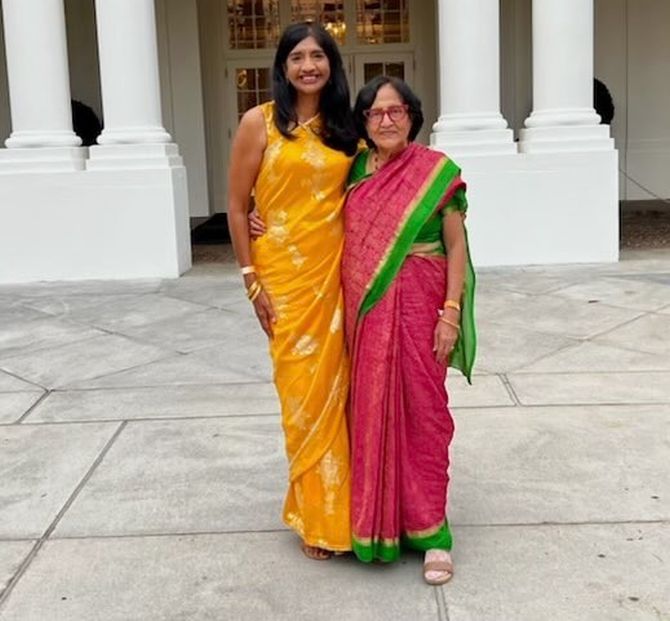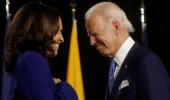'I had the Indian American community fully supportive from day one when I ran and they said, Yes.'
'I ran again, I lost and they said, Yes.'
'I came back to them again, and they said, Yes, every time.'

Aruna Miller was sworn in as Maryland's Lieutenant Governor on Wednesday, January 18, 2023,. She is the first Indian American to be elected to the second most powerful position in any US state.
The mother of three grown up daughters, Aruna Katragadda immigrated to the US with her parents in 1972 when she was 7 and became a citizen in 2000.
She was selected as a running mate by Wes Moore, who took the oath the same day as the first Black Governor of Maryland and only the third in the nation's 246-year history.
Lieutenant Governor Governor Aruna Miller spoke to Rediff.com's US correspondent and fellow Marylander Abhijit Masih about what attracted her to politics, her goals and plans for her state and the support that she received from the Indian-American community.
Part one of a two-part interview:
When you began your political journey, did you ever think you would rise to be Lieutenant Governor?
What were your dreams objectives when you began your political career?
First off, this is serendipitous that I happen to be in the role of public service as an elected official.
This was never in my horizon to ever run for public office. But so it happens.
Sometimes you have plans for life. And other times, life has plans for you.
I kind of fell into this role. I went in to vote for the first time in the year 2000 when I became a US citizen.
The outcome of that election wasn't what I wanted. I was frustrated by that.
So I reached out to the local Democratic Party to see what I can do. I started volunteering.
And as I volunteered for about four or five years, an opening came up, and they asked me to run for office.
My immediate reaction was thank you, but no thanks. Because this was never something I ever thought of doing.
I ended up running and winning for Maryland State delegate.
And then in 2018, I decided to run for US Congress for Congressional District Six in Maryland.
I came in second place, so I didn't prevail in the primary.
And after that, fast forward to 2021. Again, serendipitous, I get a call from Governor elect Wes Moore.
I meet with him and I was so impressed by him. Ultimately, he asked me to join the ticket. I said, Yes.

What interests you most about politics? Is it making policy that changes lives or making a difference to the everyday life of your constituents?
It is all of that. I would say that one thing I learned after becoming a Maryland State delegate is that I realized just how powerful policy making is, to the lives of so many people.
Policymaking impacts one's lives, from the moment we wake up till the moment we close our eyes.
It can liberate communities and empower them, or it can oppress them for generation after generation.
That's one thing that I found so profound and important to be a policymaker.
And the other is exactly what you described, constituents services.
As a representative, my role is to make people's lives easier.
Government should not create more obstacles when people are trying to get services, we should be removing those obstacles so people can get the services they deserve, and can pursue the dreams they want.
So those two combinations is the greatest part of being in this role.

Looking back at your political career, what achievements have given you the greatest pleasure?
I think the greatest pleasure is being able to want more people engaged in public policy, and to seek a life in public service.
I find public service to be one of the most gratifying things that I've ever done.
My whole life has been devoted to public service.
I just hope that my role, whether it was in the executive side of government, or the legislative side, will encourage others who normally you don't see in these two departments, to encourage them to seek a life in public service.
I do see people that were never engaged before, are saying, you motivated me to volunteer, to seek a college degree in political science, and it's not me motivating them.
I think it's just that they want to feel included in the process.
So when they see people that look like them, then they feel like wow, maybe I can have representation in these other areas and paths that I never thought that I would have an opportunity yet.

You spoke of your constituents and inspiring them. What have been some of the nicest things that you've been told over the years?
You don't do this unless you love to do it. So you're gonna hear wonderful things from constituents.
Most recently, I had an individual that I met when I was a delegate, and he used to provide room service when I was staying at a hotel in Annapolis.
During the 90 day session, I would stay there Monday through Friday.
And this particular individual always came to the room, and he delivered vegetarian meals, because I'm a veggie.
Every night I'd order the same thing, and he would deliver it, and we would chit chat and talk.
So I haven't heard and seen him in five years and I get a direct message.
He tells me he got married, had a baby and they named the baby Penelope Aruna.
I asked him if he knew what Aruna means. He said No and that he got a positive reaction from me and wanted to name the baby after me.
I told him Aruna means the rising sun. He was so tickled when he heard that, but when a person decides to name their child after you, that's profound.

Has being an Indian American ever been an obstacle in your political career? Would you have made the same headway had your last name remained Katragadda?
It's hard to say. I think every candidate faces their own obstacles when they run for office.
In the case of someone like me -- a woman of color, the obstacles are probably a little different than that of a Caucasian male.
Again, both of us face our obstacles.
I used to think, and one of the reasons why I didn't want to run for office first, was that there is no way somebody like me, that looks like me would ever get elected in this district.
Because there was nobody like me that ever got elected here before.
So I made assumptions about myself, and about the voters. I was wrong.
Because my name is Aruna, and yes, my name is Miller.
But that didn't detract them they still voted for me.
So to your question, I'll say no, your name has nothing to do with it.
You continue to see people of all different backgrounds with unique names that are not traditional Western names that are getting elected.
I don't think it would have deterred me if my name was Katragadda.
Yes, the lawn sign would have been a whole lot bigger for sure.

Has the Indian American community assisted your campaign?
Absolutely. I would not be in this position if it wasn't for the support of so many individuals that have led to this moment.
My family sacrificed a lot for my siblings and the need to have the opportunities we have.
Our responsibility is to do the same, we move forward, and we create opportunities not just for our family, but for those that have been marginalized and cast aside and left behind.
That's our responsibility in this world, to make it a better place for those that have been left behind.
In my case, I had the Indian American community fully supportive from day one when I ran and they said, Yes.
I ran again, I lost and they said, Yes.
I came back to them again, and they said, Yes, every time.
So I have so many individuals that have played a big role in empowering me and encouraging me every step of the way.
What do you say to young Indian Americans who want to enter politics?
I say, absolutely do it. But do it with the intention of helping others. It may lead to you running for higher office, absolutely. But that should not be your goal.
Your goal is to be a representative. This is public service.
Your goal is to remove obstacles for your constituents, represent their values that they trusted in you, have open dialogue with your constituents every step of the way, have that engagement with them as often as you can, and to always fight for those that have been left behind.
That's what it's all about.

I believe it was your husband who encouraged and propelled you into politics. What did he see in you that you may not have seen in yourself?
I think as individuals, we tend to be our own worst critics. And it takes a loving spouse to realize your strengths that you may not ordinarily see.
My husband looked at me and said, you're a public servant at heart.
You love public service, that's what you're doing right now as a transportation engineer.
If you get elected, you get to continue to be a public servant, but at a bigger and broader level.
It just didn't occur to me at the moment, because you think when you are running for office, you are a politician and they are different from being a public servant.
I came to realize, they are not.
I think it was Senator Barbara Mikulski who said politics is social work with power.
That's what it's about, you can do so much social justice and you have the avenues to help so many people in this role.
So he saw in me that I love public service. I just couldn't imagine doing anything but public service in my life.
Feature Presentation: Aslam Hunani/Rediff.com










